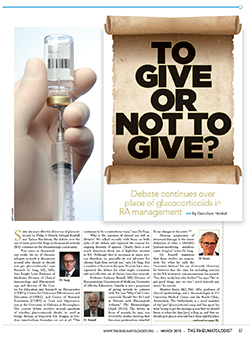Glucocorticoids: The Debate Continues
Déjà vu … In past decades, rheumatologists have seen, heard, practiced and taught much of what has been argued in the “ongoing debate” on the use of glucocorticoids (GCs) in the management of rheumatoid arthritis (RA).1 It is heartening to note that eminent professors have stuck to their premise all these years, as have I for decades (see “To Give or Not to Give? Debate continues over place of glucocorticoids in RA management,” The Rheumatologist, March 2015).
Having worked in India for most of my professional career, I may add to the confusion. Asian Indians as a race do not tolerate GCs well. The reason could possibly be that Asian Indians are highly prone to metabolic syndrome.2,3 Given even in small daily doses, GCs have adverse effects, mostly related to the metabolic syndrome.
Poverty is the second related issue. This puts biologicals out of reach for most. Therefore, in India we mostly use DMARD combos with bridging therapy, by way of depot-GC injections or orally for a short term. However, this creates problems. Because GCs are the cheapest and the most powerful pain reliever, the patient quickly perceives this as the real drug. With inherent difficulties in travel to reach a rheumatologist (e.g., poor facilities for differently abled persons in India) and the involved expense, they fall back on the magic pill! These are kept for handy use and popped frequently without recourse to further medical advice. Over time, as the GC dose becomes less effective, they often simply increase the dose on their own. It’s important to note that in India, most drugs, especially GCs, can be obtained over the counter without prescription. The appearance of such patients when they finally decide to return to the rheumatologist after a gap of five years or so for further treatment is familiar to rheumatologists, especially of my generation: what we used to call a steroid wreck—an obese, wheelchair-bound, semi-blind person with advanced Cushingoid features, extensive steroid purpura, some healed and some not-so-well-healed fractures, diabetes and hypertension, along with advanced joint damage and deformities.

After dealing with such patients for 47 years, I have two important take-home lessons. First, pharmaceutical companies should change the taste: Prednisolone tablets are easy on the palate. If a GC pill were extremely bitter, it might discourage casual popping, as people do with gum or candy, whenever there is pain. Methylprednisolone (MP) is such a tablet. In addition to being more expensive, it tastes horrible, so bitter that patients plead with me not to prescribe it. So I started substituting MP for prednisolone.


